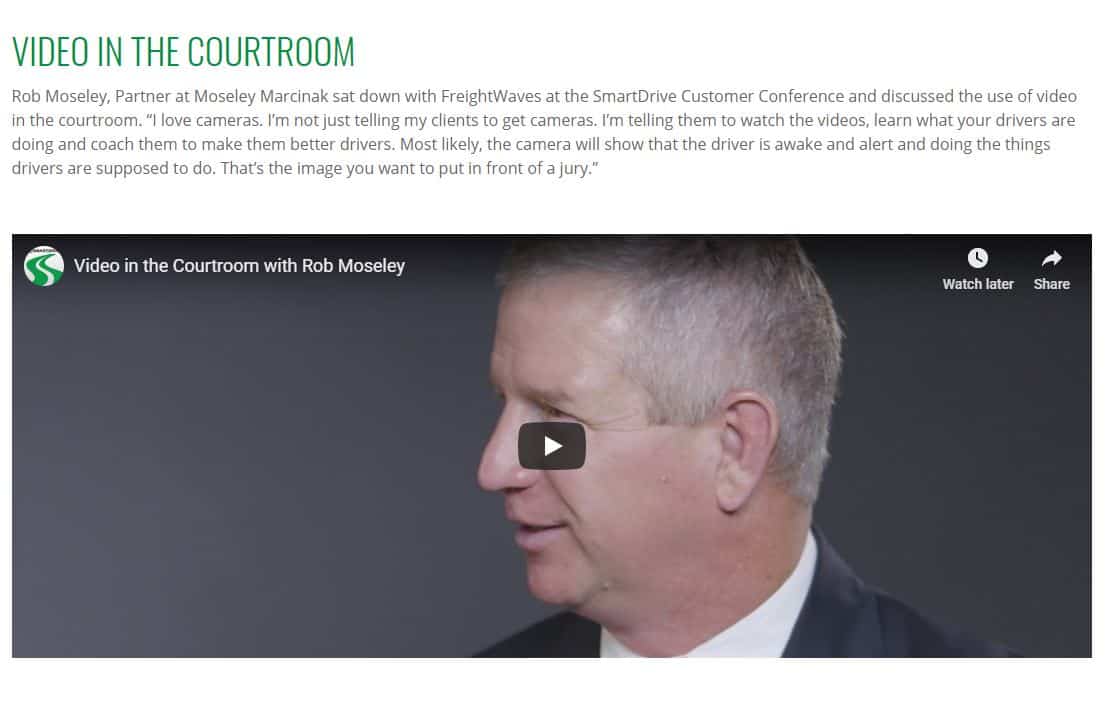
This is another in a series of videos produced by FreightWaves and SmartDrive, recorded at the recent SmartDrive Customer Conference in Atlanta. FreightWaves editor-at-large John Kingston discussed several key issues in trucking and transport with both SmartDrive executives and several conference speakers.
Cameras in the cab may show that a truck driver was at fault in an accident but that one drawback will be negated by a wide variety of positives from having that equipment on a truck.
That’s the view of Robert Moseley, a partner with the South Carolina firm of Moseley Marcinak Law Group. Moseley was a speaker at the recent SmartDrive Customer Conference in Atlanta and sat down for a video interview during that gathering.

“I love cameras,” Mosely said during the interview. “I’m not just telling my clients to get cameras. I’m telling them to watch the videos, learn what your drivers are doing and coach them to make them better drivers.”
And if the camera of an incident reveals that the driver is at fault, Moseley said, “we’d still rather know what happened than have a really bad accident and have the driver tell us a story that’s not true.” He estimated the percentage of times when the camera reveals the driver to be at fault is between 15 and 20%.
More likely, Moseley said, is that the camera will show “that the driver is awake and alert and doing the things drivers are supposed to do. That’s the image you want to put in front of a jury.”
Most companies that do have cameras are using them for more than just recording incidents, Moseley said. “You have to use the data,” he added. “If there is anything litigation teaches you, it’s that you’re responsible for the data you have or could have had.”
That’s why it is important that cameras not be added on an ad hoc basis, he said. “Murphy’s Law” is very much at work, Moseley said. “The truck that gets into the accident is going to be the one without the camera.”

Noble1
Quote :
“The truck that gets into the accident is going to be the one without the camera.”
Wow ! Really ? No he didn’t really go there . That statement is so full of BS and incredibly bias it reeks galore !
Like if a freaking camera is what will prevent a collision , LOL !
Not only does that statement taint his judgement capability , it also puts to question his credibility . Wow one could not have put his foot in his mouth any better than that !
Was he paid to state such an ignorant statement ?
In my humble opinion …………..
Noble1
Quote:
“If there is anything litigation teaches you”
IS THAT IN QUEBEC CANADA THE SYSCO UNION WON AGAINST IN CAB COMMERCIAL TRUCK DIVER FACING CAMERAS !!!
Quote:
“On Sept. 11, Sysco Quebec was ordered by the court to remove driver-facing cameras in all of its trucks, claiming that the driver-facing Lytx DriveCams were not the only way Sysco could promote safety in its fleet, and there were other “less intrusive” methods to do so.
The battle of the cameras began in 2012 when Sysco Quebec invested in camera technology and installed driver- and outward-facing cameras in its trucks. The decision to do this did not sit well with drivers, who found the driver-facing cameras a gross invasion of privacy.”
Surveillance must not single out a specific employee !
Google it ! Driver-Facing Cameras: Canadian Court Rules Against Invasion of Privacy
In my humble opinion …………….